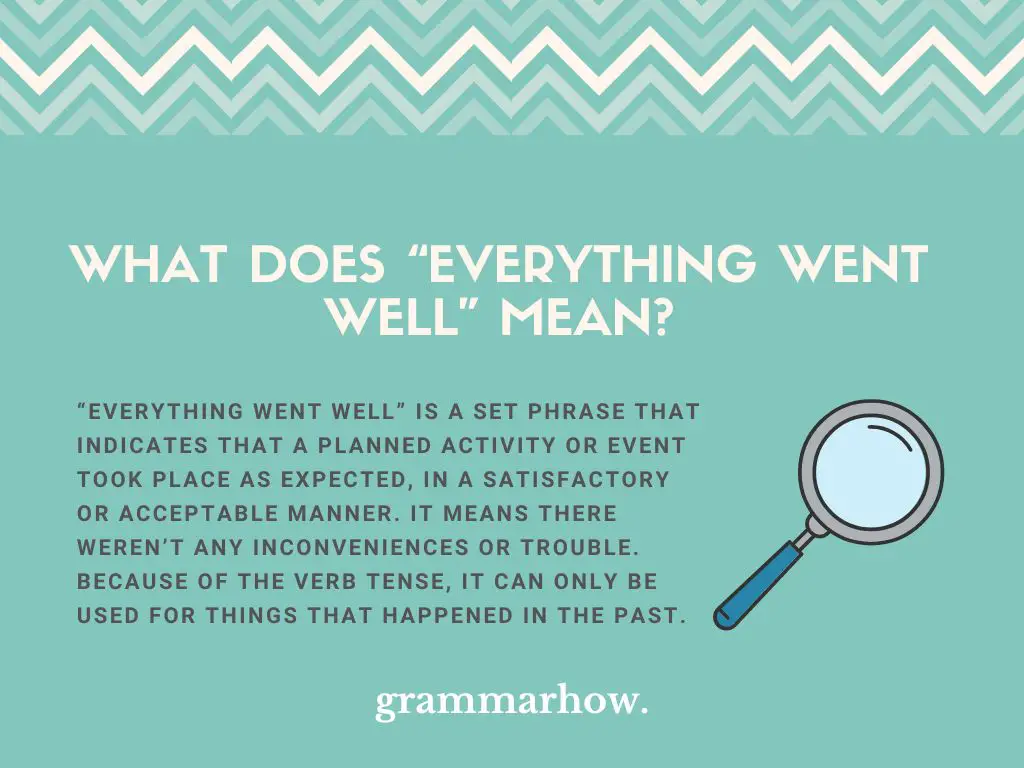How do you tell people around you that things went as planned? Imagine a situation where there’s no drama, but that’s not outstanding either – a situation that was ok, an event that was just fine.
For situations like this, there’s the phrase “Everything Went Well”. Let’s take a look!
What Does “Everything Went Well” Mean?
“Everything Went Well” is a set phrase that indicates that a planned activity or event took place as expected, in a satisfactory or acceptable manner. It means there weren’t any inconveniences or trouble. Because of the verb tense, it can only be used for things that happened in the past.

Take a look at some examples below:
- Everything went well with the dinner last night.
- Everything went well at the job interview, so I’m hopeful they’ll call me back.
“Everything Went Well” is a common way to express that something that was done or happened in the past was fine, as it should have been. It indicates there wasn’t any major problems, but it wasn’t an exceptional amazing event either. It was “Well”.
People often use that expression to tell other in their personal lives that everything was ok. But it can also be used in a professional environment, to keep your team in the loop about what happened and is relevant to the work you’re performing.
There are many ways you can use the phrase “Everything Went Well”.
How to Use “Everything Went Well” In a Sentence
“Everything Went Well” reflects an event in the past, so make sure to use it to indicate past activities. Also, “Everything Went Well” shouldn’t be used for things that went great or exceeded expectations.
When an event in the past went down as planned, with no major surprises, that’s when you should use this phrase.
Take a look at some sentences that use the phrase “Everything Went Well”:
- Everything went well at the doctor’s appointment, and you have nothing to worry about.
- Surprisingly, everything went well at work and no one got fired.
- Everything went well during the presentation, and I think the client approved it.
- Everything went well during the meeting, don’t you think?
- Did everything go well during your date, Anna?
- Everything went well at first, but things went south fairly quickly aftes Tom arrived.
Take a look at sentence 5. It indicates a part event, but because it’s a question (and not an affirmation), the correct variation is “Did Everything Go Well”.
Also, in sentence 6, you see a story that begins with “Everything Went Well”, but brings a plot twist to the story.
All of those variations are acceptable ways to use the phrase “Everything Went Well”.
Went Well vs. Go Well
The difference between “Went Well” and “Go Well” is the verb tense. “Went Well” can only be used to describe events that took place in the past, while “Go Well” can be used to talk about current events as well as future ones.
Let’s see some examples that use “Went Well” first, followed by an adjusted sentence including “Go Well” (or one of its variations):
- The meeting with the prospect client went well.
- I hope the meeting with the prospect goes well!
- Paul told us that his date last night went well.
- Paul texted and said his date tonight is going well.
- Everything went well at Dad’s doctor’s appointment.
- I expect everything to go well at Dad’s doctor’s appointment.
“Everything Went Well” – Synonyms
“Everything Went Well” has become a very common phrase to describe how an event went down. But it’s not the only one. There are many synonyms out there you can choose from, to express that your latest activity went as expected.
Take a look at some examples:
- All went well
- Things went adequately
- Everything was fine
- It all worked out
- It was quite good
- It went fine
- Come along nicely
Final Thoughts
“Everything Went Well” is a common way to describe someone’s latest activities, and let people know that it went as expected, with no major inconveniences or surprises (good or bad). You can use that expression in your daily communications, both in informal and formal settings, because it also works professionally.

Martin holds a Master’s degree in Finance and International Business. He has six years of experience in professional communication with clients, executives, and colleagues. Furthermore, he has teaching experience from Aarhus University. Martin has been featured as an expert in communication and teaching on Forbes and Shopify. Read more about Martin here.

